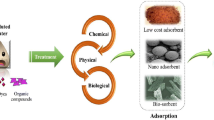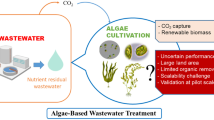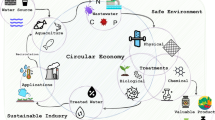Abstract
Forward osmosis is envisioned as a technology for microalgae concentration but fouling propensity during dewatering is currently a limiting factor that requires better understanding. The purpose of this study is to define the impact of microalgae culturing conditions on the downstream forward osmosis (FO) separation process—water recovery and microalgae harvesting. Chlorella vulgaris was cultivated in an outdoor lab-scale reactor fed with synthetic wastewater mimicking primary settled municipal influent under changing environmental conditions (temperature, solar radiation, nutrient balance) with varying hydraulic retention time. High efficiency of nutrient removal was achieved under all tested conditions but microalgae autoflocculation and lower rate of pollutant removal were observed with batches where culturing temperature (6.5–21 °C), solar irradiation rate (181 W/m2), and nitrogen/phosphorous ratio (2.9) were below the optimal range. Regarding FO concentration, high initial water fluxes (in the range of 18.2 to 19.5 L·m2·h−1) and water extraction rate (60.1–83.9%) were observed in all subsequent FO concentration tests. Significant membrane fouling (microalgae deposition on surface) associated with poor biomass recovery from the FO cell was found to be dependent on exopolymeric substance accumulation, which was a response to non-optimal environmental culturing conditions.








Similar content being viewed by others
References
Andersen RA (2005) Algal culturing techniques. Elsevier, Amsterdam
Babel S, Takizawa S, Ozaki H (2002) Factors affecting seasonal variation of membrane filtration resistance caused by Chlorella algae. Water Res 36:1193–1202. https://doi.org/10.1016/s0043-1354(01)00333-5
Benemann JR, Tillett DM, Weissman JC (1987) Microalgae biotechnology. Trends Biotechnol 5:47–53. https://doi.org/10.1016/0167-7799(87)90037-0
Bilad MR, Arafat HA, Vankelecom IF (2014) Membrane technology in microalgae cultivation and harvesting: a review. Biotechnol Adv 32:1283–1300. https://doi.org/10.1016/j.biotechadv.2014.07.008
Bitton G (2002) Encyclopedia of environmental microbiology. Wiley Online Library
Blandin G, Verliefde ARD, Le-Clech P (2015) Pressure enhanced fouling and adapted anti-fouling strategy in pressure assisted osmosis (PAO). J Membr Sci 493:557–567. https://doi.org/10.1016/j.memsci.2015.07.014
Blandin G, Verliefde AR, Comas J, Rodriguez-Roda I, Le-Clech P (2016a) Efficiently combining water reuse and desalination through forward osmosis-reverse osmosis (FO-RO) hybrids: a critical review. Membranes (Basel) 6:37. https://doi.org/10.3390/membranes6030037
Blandin G, Vervoort H, D’Haese A, Schoutteten K, Bussche JV, Vanhaecke L, Myat DT, le-Clech P, Verliefde ARD (2016b) Impact of hydraulic pressure on membrane deformation and trace organic contaminants rejection in pressure assisted osmosis (PAO). Process Saf Environ Prot 102:316–327. https://doi.org/10.1016/j.psep.2016.04.004
Blandin G, Vervoort H, Le-Clech P, Verliefde ARD (2016c) Fouling and cleaning of high permeability forward osmosis membranes. J Water Process Eng 9:161–169. https://doi.org/10.1016/j.jwpe.2015.12.007
Blandin G, Gautier C, Sauchelli Toran M, Monclús H, Rodriguez-Roda I, Comas J (2018a) Retrofitting membrane bioreactor (MBR) into osmotic membrane bioreactor (OMBR): a pilot scale study. Chem Eng J 339:268–277. https://doi.org/10.1016/j.cej.2018.01.103
Blandin G, Rodriguez-Roda I, Comas J (2018b) Submerged osmotic processes: design and operation to mitigate mass transfer limitations. Membranes (Basel) 8:72. https://doi.org/10.3390/membranes8030072
Boonchai R, Kaewsuk J, Seo G (2014) Effect of nutrient starvation on nutrient uptake and extracellular polymeric substance for microalgae cultivation and separation. Desalin Water Treat 55:360–367. https://doi.org/10.1080/19443994.2014.939501
Buckwalter P, Embaye T, Gormly S, Trent JD (2013) Dewatering microalgae by forward osmosis. Desalination 312:19–22. https://doi.org/10.1016/j.desal.2012.12.015
Cath T, Childress A, Elimelech M (2006) Forward osmosis: principles, applications, and recent developments. J Membr Sci 281:70–87. https://doi.org/10.1016/j.memsci.2006.05.048
Delrue F, Álvarez-Díaz P, Fon-Sing S, Fleury G, Sassi J-F (2016) The environmental biorefinery: using microalgae to remediate wastewater, a win-win paradigm. Energies 9:132. https://doi.org/10.3390/en9030132
Desormeaux E (2017) Porifera: creating a world with less waste, water reuse instead of discarded, concentrated products. Erik-desormeaux.squarespace.com/s/Porifera-Technology-Overview-March2017.pdf. Accessed 01/03/2017
Gao F, Li C, Yang ZH, Zeng GM, Feng LJ, Liu JZ, Liu M, Cai HW (2016) Continuous microalgae cultivation in aquaculture wastewater by a membrane photobioreactor for biomass production and nutrients removal. Ecol Eng 92:55–61. https://doi.org/10.1016/j.ecoleng.2016.03.046
González LE, Cañizares RO, Baena S (1997) Efficiency of ammonia and phosphorus removal from a colombian agroindustrial wastewater by the microalgae Chlorella vulgaris and Scenedesmus dimorphus. Bioresour Technol 60:259–262. https://doi.org/10.1016/s0960-8524(97)00029-1
He H, Chen Y, Li X, Cheng Y, Yang C, Zeng G (2017) Influence of salinity on microorganisms in activated sludge processes: a review. Int Biodeterior Biodegrad 119: 520–527
Hernández-Garibay E, Zertuche-González JA, Pacheco-Ruíz I (2010) Isolation and chemical characterization of algal polysaccharides from the green seaweed Ulva clathrata (Roth) C. Agardh J Appl Phycol 23:537–542. https://doi.org/10.1007/s10811-010-9629-0
Hoek C, Mann D, Jahns HM (1995) Algae: an introduction to phycology. Cambridge university press, Cambridge
Honda R, Rukapan W, Komura H, Teraoka Y, Noguchi M, Hoek EM (2015) Effects of membrane orientation on fouling characteristics of forward osmosis membrane in concentration of microalgae culture. Bioresour Technol 197:429–433. https://doi.org/10.1016/j.biortech.2015.08.096
Hoover LA, Phillip WA, Tiraferri A, Yip NY, Elimelech M (2011) Forward with osmosis: emerging applications for greater sustainability. Environ Sci Technol 45:9824–9830. https://doi.org/10.1021/es202576h
Kwon B, Park N, Cho J (2005) Effect of algae on fouling and efficiency of UF membranes. Desalination 179:203–214. https://doi.org/10.1016/j.desal.2004.11.068
Larronde-Larretche M, Jin X (2017) Microalgal biomass dewatering using forward osmosis membrane: influence of microalgae species and carbohydrates composition. Algal Res 23:12–19. https://doi.org/10.1016/j.algal.2016.12.020
Lay WCL, Liu Y, Fane AG (2010) Impacts of salinity on the performance of high retention membrane bioreactors for water reclamation: a review. Water Res 44:21–40. https://doi.org/10.1016/j.watres.2009.09.026
Mazzuca Sobczuk T, Ibáñez González MJ, Molina Grima E, Chisti Y (2015) Forward osmosis with waste glycerol for concentrating microalgae slurries. Algal Res 8:168–173. https://doi.org/10.1016/j.algal.2015.02.008
Novoveská L, Zapata AKM, Zabolotney JB, Atwood MC, Sundstrom ER (2016) Optimizing microalgae cultivation and wastewater treatment in large-scale offshore photobioreactors. Algal Res 18:86–94. https://doi.org/10.1016/j.algal.2016.05.033
Parida V, Ng HY (2013) Forward osmosis organic fouling: effects of organic loading, calcium and membrane orientation. Desalination 312:88–98. https://doi.org/10.1016/j.desal.2012.04.029
Phuntsho S, Hong S, Elimelech M, Shon HK (2014) Osmotic equilibrium in the forward osmosis process: modelling, experiments and implications for process performance. J Membr Sci 453:240–252. https://doi.org/10.1016/j.memsci.2013.11.009
Praveen P, Loh KC (2016) Nitrogen and phosphorus removal from tertiary wastewater in an osmotic membrane photobioreactor. Bioresour Technol 206:180–187. https://doi.org/10.1016/j.biortech.2016.01.102
Puig S, Coma M, van Loosdrecht MCM, Colprim J, Balaguer MD (2007) Biological nutrient removal in a sequencing batch reactor using ethanol as carbon source. J Chem Technol Biotechnol 82:898–904. https://doi.org/10.1002/jctb.1754
Radjenović J, Matošić M, Mijatović I, Petrović M, Barceló D (2008) Membrane bioreactor (MBR) as an advanced wastewater treatment technology. In: Emerging contaminants from industrial and municipal waste. Springer, pp 37–101
Rickman M, Pellegrino J, Davis R (2012) Fouling phenomena during membrane filtration of microalgae. J Membr Sci 423-424:33–42. https://doi.org/10.1016/j.memsci.2012.07.013
She Q, Wang R, Fane AG, Tang CY (2016) Membrane fouling in osmotically driven membrane processes: a review. J Membr Sci 499:201–233. https://doi.org/10.1016/j.memsci.2015.10.040
Spellman FR (2013) Handbook of water and wastewater treatment plant operations. CRC press, Boca Raton
Sturm BSM, Lamer SL (2011) An energy evaluation of coupling nutrient removal from wastewater with algal biomass production. Appl Energy 88:3499–3506. https://doi.org/10.1016/j.apenergy.2010.12.056
Sunda WG, Price NM, Morel FM (2005) Trace metal ion buffers and their use in culture studies. Algal culturing techniques. 4:35–63
Trent J, Wiley P, Tozzi S, McKuin B, Reinsch S (2014) Research spotlight: the future of biofuels: is it in the bag? Biofuels 3:521–524. https://doi.org/10.4155/bfs.12.53
Udom I, Zaribaf BH, Halfhide T, Gillie B, Dalrymple O, Zhang Q, Ergas SJ (2013) Harvesting microalgae grown on wastewater. Bioresour Technol 139:101–106. https://doi.org/10.1016/j.biortech.2013.04.002
Wang L, Liu J, Zhao Q, Wei W, Sun Y (2016) Comparative study of wastewater treatment and nutrient recycle via activated sludge, microalgae and combination systems. Bioresour Technol 211:1–5. https://doi.org/10.1016/j.biortech.2016.03.048
Ye Y, Clech PL, Chen V, Fane AG (2005) Evolution of fouling during crossflow filtration of model EPS solutions. J Membr Sci 264:190–199. https://doi.org/10.1016/j.memsci.2005.04.040
Ye J, Zhou Q, Zhang X, Hu Q (2018) Microalgal dewatering using a polyamide thin film composite forward osmosis membrane and fouling mitigation. Algal Res 31:421–429. https://doi.org/10.1016/j.algal.2018.02.003
Zhang X, Hu Q, Sommerfeld M, Puruhito E, Chen Y (2010) Harvesting algal biomass for biofuels using ultrafiltration membranes. Bioresour Technol 101:5297–5304. https://doi.org/10.1016/j.biortech.2010.02.007
Zou S, Gu Y, Xiao D, Tang CY (2011) The role of physical and chemical parameters on forward osmosis membrane fouling during algae separation. J Membr Sci 366:356–362. https://doi.org/10.1016/j.memsci.2010.10.030
Zou S, Wang Y-N, Wicaksana F, Aung T, Wong PCY, Fane AG, Tang CY (2013) Direct microscopic observation of forward osmosis membrane fouling by microalgae: critical flux and the role of operational conditions. J Membr Sci 436:174–185. https://doi.org/10.1016/j.memsci.2013.02.030
Acknowledgments
LEQUIA and ICRA were recognized as consolidated research groups by the Catalan Government with codes 2017-SGR-1552 and 2017 SGR 1318 respectively.
Funding
The research leading to these results has received funding from the People Programme (Marie Curie Actions) of the Seventh Framework Programme of the European Union (FP7/2007-2013) under REA grant agreement n° 600388 (TECNIOspring programme), and from the Agency for Business Competitiveness of the Government of Catalonia, ACCIO.
Author information
Authors and Affiliations
Corresponding author
Additional information
Responsible editor: Gerald Thouand
Electronic supplementary material
ESM 1
(DOC 194 kb)
Rights and permissions
About this article
Cite this article
Onyshchenko, E., Blandin, G., Comas, J. et al. Influence of microalgae wastewater treatment culturing conditions on forward osmosis concentration process. Environ Sci Pollut Res 27, 1234–1245 (2020). https://doi.org/10.1007/s11356-018-3607-5
Received:
Accepted:
Published:
Issue Date:
DOI: https://doi.org/10.1007/s11356-018-3607-5




